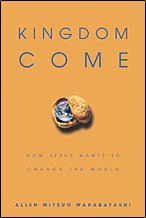Kingdom Come
 How Jesus Wants to Change the World
How Jesus Wants to Change the WorldAllen Mitsuo Wkabayashi
There are lots of books on the Kingdom of God out there to read. Most of them are either highly academic and difficult to read or they simply have poor view of the kingdom of God. This book is probably the first book with great kingdom theology that is accessible to just about any reader who would be interested in reading about the kingdom of God.
The basic premise of the book is that the gospel is bigger than what we give it credit for. We tend to think of it as what we need to believe to get to heaven, but such thinking (as true as it is) alone does not compel us to live a life of mission. Allen is seeking to give us a fuller picture of the kingdom (or, better, reign) of God--that God "has broken into history in the person and work of Jesus Christ. The blessings, power and justice of the future kingdom of God have reached back into the present and taken root in our world" (p. 145). God's reign in this world is intent on reclaiming all that was lost in the fall, not just human souls (as important as that aspect of the gospel is). When we understand the nature of the kingdom and the message of the gospel, we are then compelled to live life with a sense of mission--seeking not only to care for the poor, but to get involved in redeeming the societal structures that cause people to end up in poverty to begin with.
Yet this is not bare theology. Woven throughout the book are helpful illustrations and life examples from even his own marriage, as he and his wife have needed to graple the reality of abuse and rape and the tension those realities create for what we believe about Jesus and His kingdom.
I have one issue with chapter 11 on "Conversion." There he seems to draw too hard a dichotomy (my guess is that it's not intended) between what Dallas Willard calls "gospels of sin management" and a kingdom-oriented gospel. To be sure, he and Dallas Willard are correct to point out that the problems we face in discipliship can be traced directly to the way we present the gospel--we tend to focus exclusively on having all our past, present, and future sins forgiven in Christ so that we can get to heaven when we die. If that's the sum total of the gospel, then there's precious little reason to live a holy life afterwards. New converts can easily balk at the cost of discipliship with the objection, "I didn't sign up for this. I just wanted to be forgiven so I could go to heaven and still live how I want."
He even gives an example of a girl who accepted his gospel presentation but later said she didn't want to stop sleeping with her boyfriend. He suggests that a kingdom oriented gospel would prevent the misunderstandings that she had--fair enough. But the solution is not to add to a gospel of forgiveness. I fear sometimes we forget the life-transforming power of the Holy Spirit (not our gospel presentations) that works through forgiveness. As Paul so aptly said, it was the kindness of God that led him to repentance. If we truly understood our own rebellion against God's kingdom (regardless of whether or not we engage in premarital sex), and if we truly understood the magnitude of our forgiveness in Christ (his righteousness has been imputed to us), then by God's Spirit our lives would change, and we would see his Kingship over us as the gracious loving reign that it really is. That's what causes change in us.
Nevertheless, I find it to be a wonderful book, and I highly recommend it for all interested in an accessible treatment of Christian living in the kingdom of God.

.jpg)
Comments